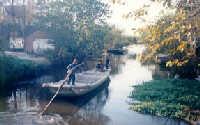 Love is the lingering theme of most Wu Songs, different from the theme of xiqu (the West Tune) and the northern rustic folk songs, which mainly center on the hardships experienced by businessmen on their trips or parting sorrows, Wu Songs have always been seen as an exotic flower in the literary history.
Love is the lingering theme of most Wu Songs, different from the theme of xiqu (the West Tune) and the northern rustic folk songs, which mainly center on the hardships experienced by businessmen on their trips or parting sorrows, Wu Songs have always been seen as an exotic flower in the literary history.
The most well known short song is entitled "Ziye Song," said to be written for a woman with the same name during the Jin Dynasty.
Like the flowing water, the short Wu Songs also have ups and downs. For instance, the songs representing the harsh lives of the poor laboring people in feudal times sound low and grave.
The mountain songs are sung at a particular time and on special occasions. Usually, the time duration spreads from the transplant of rice seedlings in spring to the harvest in autumn, and mountain songs are not sung in winter. It is really a toiling experience, plowing or weeding under the scorching sun, but singing may soothe the fatigue and help the farmers refresh themselves.
The long Wu ballads are in fact an enriched re-creation of the short songs. As the local people mainly lived on rice, in a busy farming season, they had to work long hours in the fields. In order to alleviate their fatigue, they often blended a well-plotted story into a mountain song, and sang in the fields. Besides, since wooden boats were the main traffic tool in the river-ridden area, passengers dispelled their loneliness and boredom by turning anecdotes into songs.
Author: Jessie
